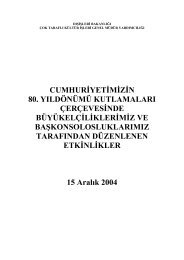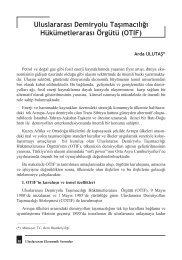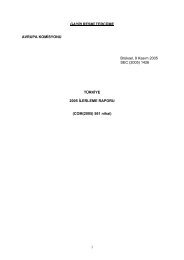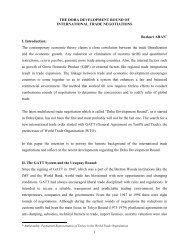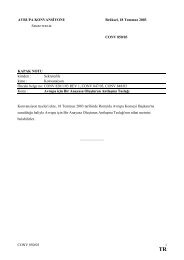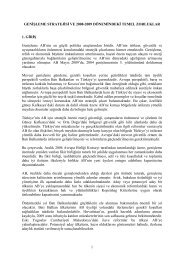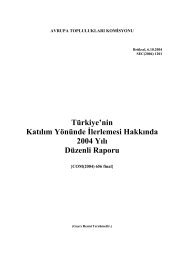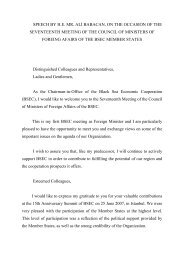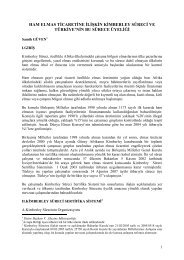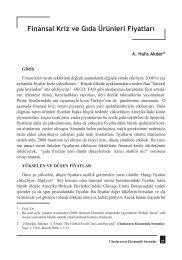ULUSLARARASI EKONOMİK SORUNLAR
ULUSLARARASI EKONOMİK SORUNLAR
ULUSLARARASI EKONOMİK SORUNLAR
You also want an ePaper? Increase the reach of your titles
YUMPU automatically turns print PDFs into web optimized ePapers that Google loves.
Özgür ÇALIŞKAN<br />
increasingly costly”(p.5) (The end of such illusion was catastrophic-two world wars).<br />
On the other hand, while US and Soviet Union were not even loosely connected<br />
economically, they sustained an uneasy peace for four decades. The political history<br />
says, as Waltz states, “the most important causes of peace, as of war, are found in<br />
international-political conditions, including the weaponry available to states” (p.5).<br />
Events after the Cold War obviously demonstrate the political weakness of economic<br />
forces. The economic interdependence of the Soviet Union and Yugoslavia did not<br />
prevent their disintegration, the conflicts and civil wars. These events have shown that<br />
“governments and people sacrifice welfare and even security in pursuit of national,<br />
ethnic and religious ends” (p.7, Waltz 2000). In the current political history, there are<br />
many examples about what happens to the society and economy when a state begins to<br />
fade away: Many African states, Russia in 1990s and currently Lebanon, Sudan,<br />
Afghanistan and Iraq. As Waltz (2000) states, “challenges at home and abroad test the<br />
mettle of states. In modern times enough, states have always passed the test to keep the<br />
international system functioning as a system of states. The challenges vary but states<br />
endure. They have proved to be hardy survivors” (p.5).<br />
From the Realistic perspective: Globalization as an instrument of politics<br />
Drawing the above current and historical facts, Realism has a strong explanatory<br />
power to analyze the global developments, despite its all drawbacks. According to<br />
realism, the international system is anarchical. Each state is a rational actor that always<br />
acts towards its own self-interest, and the primary goal of each state is to ensure its own<br />
security; not to depend on the distrust of long-term cooperation or interdependence<br />
(p.10, Mearsheimer 1994). From looking the big picture, as Carr states, “The primary<br />
laws of history are political laws, economic laws are secondary. Economic forces are in<br />
fact political forces (…). The science of economics presupposes a given political order,<br />
and cannot be profitably studied in isolation from politics”(p.79, in Betts 2005). In this<br />
vein, Realists often correctly criticize the “economism” view, i.e. an overemphasis on<br />
the importance of economic sphere along with a corresponding underemphasis on the<br />
autonomy of political sphere.<br />
From this perspective, globalization has not guarantied a period of peace and order.<br />
In the last decade, over five million people have been killed in armed conflicts around<br />
the world (p.26, Annan 2005). There are 30,000 nuclear weapons (estimated) that, if<br />
used in a global conflict, can eliminate all gains of globalization in just a few minutes.<br />
Waltz is right to state that “globalizers argue that the international economic interests<br />
of states work against their going to war. True, they do; yet if one asks whether<br />
Uluslararası Ekonomik Sorunlar 37




